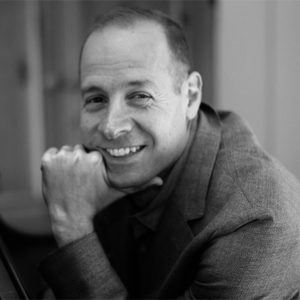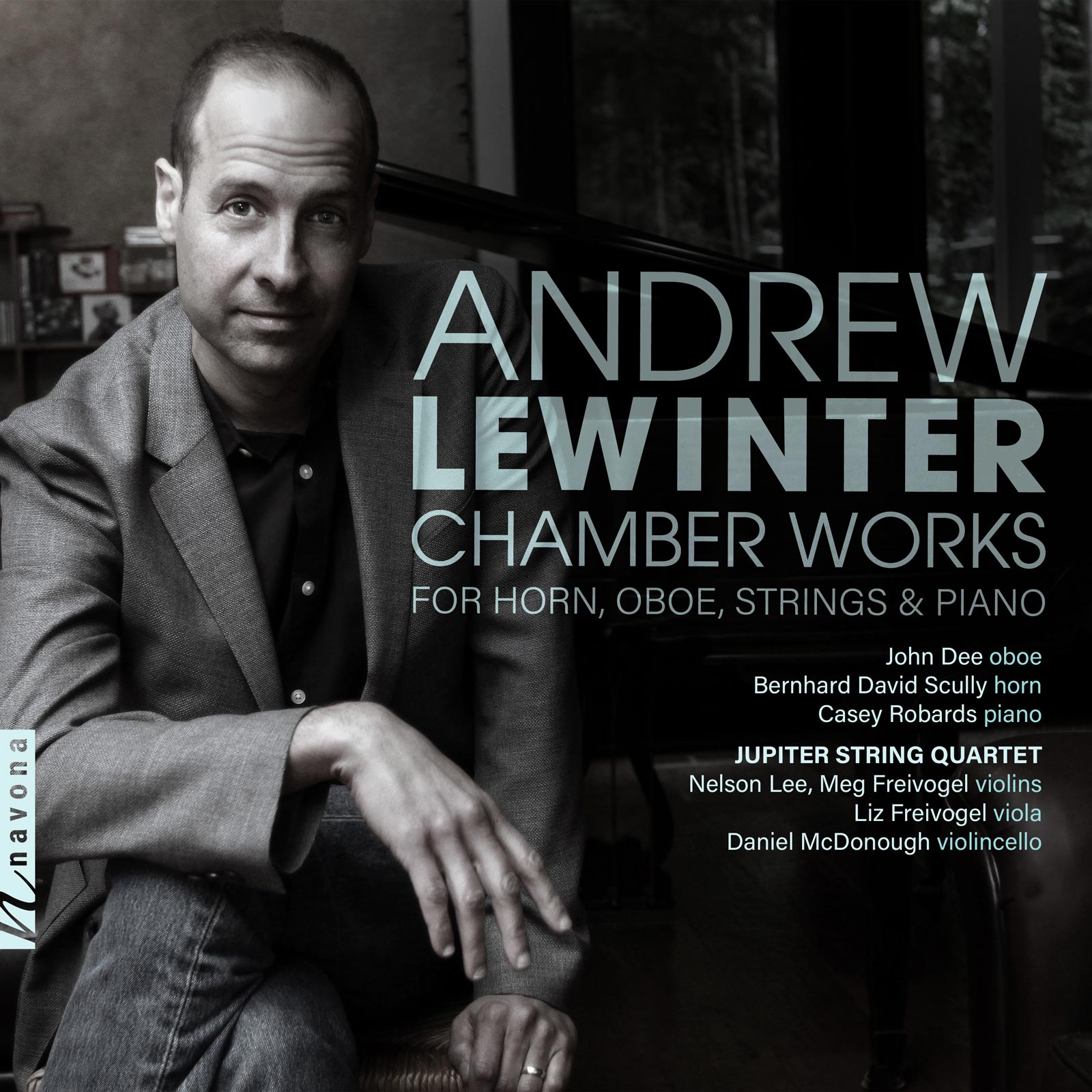Andrew Lewinter: Chamber Works
Andrew Lewinter composer
John Dee oboe
Bernhard David Scully horn
Casey Robards piano
Jupiter String Quartet | Nelson Lee violin; Meg Freivogel violin; Liz Freivogel viola; Daniel McDonough violincello
Tonality is slowly but steadily making its way into the toolbox of contemporary music again. Accomplished orchestral horn player Andrew Lewinter, who returned to composing in 2016 after a long hiatus, thankfully discovered that very toolbox, and the result can be heard on ANDREW LEWINTER: CHAMBER WORKS.
Two quintets and one trio in classical instrumentation, and the neo-Romantic tonal language to match: it’s a difficult feat to pull off. Lewinter, however, diversifies with minimalist elements and, drawing from his considerable experience as an orchestral performer, imbues his chamber works with symphonic richness. It’s the secret ingredient, and it works.
Listen
Stream/Buy
Choose your platform
Track Listing & Credits
| # | Title | Composer | Performer | |
|---|---|---|---|---|
| 01 | Trio for Oboe, Horn and Piano: I. Allegro Moderato | Andrew Lewinter | John Dee, oboe; Bernhard David Scully, horn; Casey Robards, piano | 8:31 |
| 02 | Trio for Oboe, Horn and Piano: II. Romanza | Andrew Lewinter | John Dee, oboe; Bernhard David Scully, horn; Casey Robards, piano | 4:38 |
| 03 | Trio for Oboe, Horn and Piano: III. Theme and Variations | Andrew Lewinter | John Dee, oboe; Bernhard David Scully, horn; Casey Robards, piano | 7:43 |
| 04 | Quintet for Oboe and Strings: I. Allegro | Andrew Lewinter | John Dee, oboe; Nelson Lee, violin; Meg Freivogel, violin; Liz Freivogel, viola; Daniel McDonough, violincello | 6:09 |
| 05 | Quintet for Oboe and Strings: II. Adagio | Andrew Lewinter | John Dee, oboe; Nelson Lee, violin; Meg Freivogel, violin; Liz Freivogel, viola; Daniel McDonough, violincello | 6:48 |
| 06 | Quintet for Oboe and Strings: III. Rondo | Andrew Lewinter | John Dee, oboe; Nelson Lee, violin; Meg Freivogel, violin; Liz Freivogel, viola; Daniel McDonough, violincello | 6:42 |
| 07 | Quintet for Horn and Strings: I. Allegro | Andrew Lewinter | Bernhard David Scully, horn; Nelson Lee, violin; Meg Freivogel, violin; Liz Freivogel, viola; Daniel McDonough, violincello | 6:13 |
| 08 | Quintet for Horn and Strings: II. Adagio | Andrew Lewinter | Bernhard David Scully, horn; Nelson Lee, violin; Meg Freivogel, violin; Liz Freivogel, viola; Daniel McDonough, violincello | 5:16 |
| 09 | Quintet for Horn and Strings: III. Rondo | Andrew Lewinter | Bernhard David Scully, horn; Nelson Lee, violin; Meg Freivogel, violin; Liz Freivogel, viola; Daniel McDonough, violincello | 9:24 |
Trio for Oboe, Horn and Piano
Recorded June 28-29, 2021 at Krannert Hall, University of Illinois, Champaign-Urbana IL
Recording Engineer Richard Scholwin
Producer Carlos Carillo
Quintet for Oboe and Strings, Quintet for Horn and Strings
Recorded January 8-9, 2022 at Krannert Hall, University of Illinois, Champaign-Urbana IL
Recording Engineer Richard Scholwin
Executive Producer Bob Lord
A&R Director Brandon MacNeil
A&R Danielle Sullivan
VP of Production Jan Košulič
Audio Director Lucas Paquette
VP, Design & Marketing Brett Picknell
Art Director Ryan Harrison
Design Edward A. Fleming
Publicity Patrick Niland, Brett Iannucci
Artist Information

Andrew Lewinter
Before turning his attention to composition, Andrew Lewinter had a long and varied career as an orchestral horn player and soloist. As a composer, Lewinter has a decidedly tonal and neo-romantic style that is often very contrapuntal and always emotionally gripping. His works include sonatas for each of the brass instruments and piano, a quartet for trumpet, horn, trombone and piano, quintets for both horn and string quartet and oboe and string quartet, a woodwind quintet, a string quartet, and a trio for oboe, horn, and piano, among other works scored for a variety of chamber ensembles. Lewinter’s compositions have been widely performed and recorded, and are available on Navona Records and Ablaze records.

John Dee
JOHN DEE is the Bill A. Nugent Endowed Professor of Music Performance and Professor of Oboe Studies at the University of Illinois at Urbana-Champaign. For over twenty years, Professor Dee was Principal Oboe of the Florida Philharmonic Orchestra and Florida Grand Opera Orchestra. Over this time, he was also Oboe Professor at the University of Miami in Coral Gables and Artist in Residence at the Conservatory of Music at Lynn University. Prior to this, he was Principal Oboe of the Florida Orchestra in Tampa, the Ravinia Festival Orchestra and the Civic Orchestra of Chicago. He has performed and recorded with the Saint Louis, Atlanta and Chicago Symphony Orchestras and has worked with conductors such as Carlo Maria Giulini, James Levine, Claudio Abbado and Sir Georg Solti.

Bernhard David Scully
International Horn Soloist, Bernhard Scully, is currently the Associate Professor of Horn at the University of Illinois at Urbana-Champaign and is Artistic Director of the non-profit 501(c)(3) Cormont Music. He spends most of his summer in the beautiful White Mountains of New Hampshire as both the Artistic Director of the Kendall Betts Horn Camp and as the horn player of the North Country Chamber Players. He is the former horn player of the Canadian Brass and former principal horn of the Saint Paul Chamber Orchestra. Among his many awards are top honors at numerous competitions, most notably being the first classical brass player to win a McKnight Fellowship for Performing Musicians. He has collaborated with many great North American Orchestras including the Chicago Symphony, San Francisco Symphony, Minnesota Orchestra, Cleveland Orchestra as guest principal horn, Pittsburgh Symphony as guest principal horn, and as principal horn of the Violon du Roy in Quebec City.

Casey Robards
Casey Robards, has given recitals with singers and instrumentalists throughout the United States, Europe, Central and South America and Asia. Her repertoire includes art song, opera, musical theatre, gospel and popular vocal music, string, brass, wind and chamber music. She gave her Carnegie Hall debut with baritone Christiaan Smith performing an original program of Top 40 pop songs sung as art song arrangements. In 2019, she was featured on two new CD releases: “Botanica: music for oboe and English horn” with Sara Fraker (MSR Classics) and “Chinese Fantasies” with violinist Fangye Sun (Blue Griffin). 2021-22 touring programs include solo recitals with Ollie Watts Davis, LaToya Lain, and Karen Slack, all featuring the music of Black American composers and writers.

Jupiter String Quartet
The Jupiter String Quartet is a particularly intimate group, consisting of violinists Nelson Lee and Meg Freivogel, violist Liz Freivogel (Meg’s older sister), and cellist Daniel McDonough (Meg’s husband, Liz’s brother-in-law). Now enjoying their 20th year together, this tight-knit ensemble is firmly established as an important voice in the world of chamber music.
Notes
All three compositions on this recording by Andrew Lewinter are in a decidedly romantic idiom with respect to both the harmonies and the structure of each work. All movements of each composition are interconnected and thematically related to the opening intervals of the main theme of each first movement. The oboe’s first statement of the theme of the first movement of Lewinter’s Quintet for Oboe and Strings centers around a perfect fifth and octave. Those intervals also frame the main themes of the lyrical second movement and spirited Rondo movement.
Lewinter’s Trio for Oboe, Horn, and Piano is also in three movements. The first interval of the main theme of the first movement, a descending augmented fifth, is the kernel from which the rest of the piece grows. The second movement, a Romanza, starts with a descending minor sixth. The last movement is a theme and variations, with five contrasting variations. The theme also starts on a descending minor sixth, but on the third degree and in minor. The next to last variation is a fugue on a theme that’s an inversion of the opening intervals of the movement. By the end of the work, the opening descending augmented fifth is transformed into an ascending major sixth.
The Quintet for Horn and Strings opens with a proclamation of a descending perfect fourth. That interval, as well as the ascending minor ninth of the main theme, are dual poles around which each of the work’s three movements is structured. Those intervals also structure the intimate main theme of the Adagio movement. The slow introduction to the last movement of the Quintet for horn and Strings opens with a dissonant minor ninth. A rousing Rondo follows.

